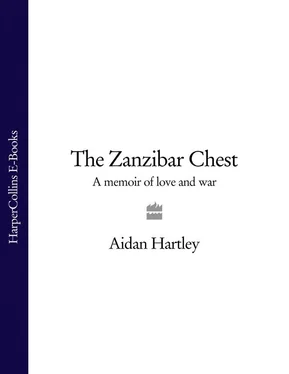1 ...6 7 8 10 11 12 ...26 In 1938, my father transferred from the Tanganyika colonial service for an appointment as head of agriculture in the Aden Protectorates, southwestern Arabia. His heart was still in East Africa. During the Great Depression he had bought a small farm called En’nekeraka at Mweiga, on the western slopes of Mount Kenya. En’nekeraka in the language of the ancestral people who had lived there evoked the sound of pebbles knocking together in the stream below the farmhouse. He aimed to one day retire to the farm, but he was still only thirty-one when he took up his Arabian appointment and the next sixteen years were to be some of the most eventful of his life.
When Dad arrived, Aden was one of the most familiar if unsightly landmarks in the empire. The pocket-sized colony, huddled around the barren mountain of Jebel Shamsan, existed solely for the benefit of the sea port. Then as now, Aden was not so much a single city as a collection of unattractive towns clinging to the volcanic rocks. Imperial officials and shipping agents lived at Steamer Point. On the isthmus of Khormaksar were the military lines and Royal Air Force base and inland from that was the Arab village of Sheikh Othman, where the desert sands blew in from the Protectorates. The heart of Aden was Crater, the quarter for Arabs, Jews, Banyans and international eccentrics. The French poet Arthur Rimbaud had pitched up here on his ill-fated scheme to run guns to the Arabs and Ethiopians. The adventurous smuggler Henri de Monfreid passed through here. In the thirties, another Frenchman, the powerful businessman Antonin Besse – who later founded an Oxford college – had built his house on the rocks overlooking Crater and it was here that he entertained the travel writer Freya Stark. In the godowns of the shabby emporium of Crater was a trade in the exotic: Mocha coffee, mother-of-pearl from Abdel Kouri, civet, cinnabar and ambergris from the island of Socotra, also mass-produced goods, from wall clocks to universal embrocations to underwear from Liverpool. My father walked among crowds of Yemenis, short men from the hills with silver jambiya daggers in their belts, or Bedu visiting from the desert, decked out in kilts, snarling in surprise as they scrambled out of the way of passing cars. There were Banyan clerks and Jewish artisans, Bohra tailors, sallow Koranic students from Hadhramaut, Swahili sailors, Somali stevedores and Chinese exporters of sea slugs and shark fins.
As far as the British were concerned, to protect Aden they had to see what was going on in the wild hinterlands, if not to control them. The inhabitants beyond the borders of the colony were divided into an impossibly complicated mosaic of clan and caste. There were the Gabilis, gun-carrying tribesmen who covered their half-clothed bodies with sesame oil and indigo woad, the Seyyids and Ashraf who believed they were descended from the tribe of the Prophet Mohamed, the nontribal traders and artisans who lived within the walls of tiny hilltop villages, and finally low-caste black serfs and slaves.
In antiquity, the Romans called this land Arabia the Blessed because its inhabitants controlled the trade in frankincense and myrrh, which was harvested in the hills of Oman, the island of Socotra and in the Horn of Africa. The valuable resins were carried by camel across the desert, via Mecca and Petra, to Gaza and from there to Egypt, Greece and Rome. In the first century AD, a Roman legion under Gaius Aelius Gallus had set out to conquer Mareb, capital of the kingdom of Saba, also known as Sheba, and been defeated when the wily Arab guides led the invaders into the waterless deserts. Soon afterwards, with the opening of the sea route from India to the Red Sea, the land route fell into decline. The mighty cities built on the back of the trade fell prey to desert raiders and crumbled into the sands.
The British seized the port of Aden in 1837. It was a dirty little village, located on an ancient site and strategically placed. But in the next century, with the completion of the Suez Canal and the invention of coal-fuelled steamships, Aden grew as wealthy and as busy as Hong Kong, the key point midway on the passage to India. The interior had been left virtually unexplored, though the British created a buffer zone of treaties of protection with tribes in the hills and deserts surrounding the colony. In the process the British elevated various petty tribal chieftains to the status of sultans, treating them to gun salutes like Indian maharajas when they dropped into Aden to pick up their annual pay-offs of rifles and silver Maria Theresa dollars from Government House. In return for their stipends, the sultans agreed to show allegiance to the British Crown, rather than to the Imam, the sacerdotal ruler of the high Yemen to the north who coveted Aden port and the hinterlands. Otherwise they were left to their own devices, even to the extent that slavery existed under British rule.
On the eve of the Second World War, Britain finally decided on a new ‘forward policy’ to develop the hinterland. To do that, and to consolidate the Protectorate frontiers against incursions from the Imam’s Yemen to the north, they enrolled men like Dad to end tribal feuding and establish irrigation farming, police forces, schools and roads.
One of the first British officials Dad met in Arabia was Harold Ingrams, the Resident Adviser to the Hadhramaut, in the Eastern Aden Protectorates. Ingrams was among Britain’s most revered Arabists. He told my father he should at all times respect Arab customs, refrain from alcohol and dress in the local garb. Ingrams himself went in for the authentic look, fluttering about in a Saudi headdress, an Indonesian lungyi, a big belt and silver and ornaments and bracelets. Around his neck he wore a Bedouin leather necklace with a large agate stone. He wore boots and he limped, the result of a wound sustained on the Western Front. Ingrams was famous for negotiating a peace settlement between the warring Hadhramaut clans that was so complicated it involved separate truces to end two thousand long-standing blood feuds. Dad admired Ingrams but thought him somewhat pompous and much later he remembered a ditty about him.
They call me Headline Harold
In my home in Hadhramaut,
Where I toil all day for plenty of pay
In my simple Saudi suit.
My father adored his job and the fact that he was among just seven Englishmen covering a territory of a hundred thousand square miles. He was in Arabia for sixteen years, which he spent constantly on long journeys, on foot, on horseback, in rickety Vickers Vincent biplanes. He worked with the political officers in the colonial services whose task was to broker peace negotiations to end the perpetual clan conflicts. Refuse to declare a truce and the political officer could call in the Vickers Vincent to bomb a recalcitrant sheikh out of his fortress. Make peace and my father came in as the agriculture officer to reward the tribes and bolster peace by reviving irrigation systems and planting cotton, fruit trees and food crops. He introduced the husbandry of cotton, but also everything else from cabbages and apricots, to large red chickens to the unsuspecting tribes. He traversed an often hostile country with no more protection than a bodyguard and his skill in talking his way out of tight situations.
In 1949, my mother was offered a job as the governor’s confidential secretary in Aden. ‘How is Aden?’ she asked Grandpa, who had fought the Turks there in the Great War. ‘Bloody awful,’ he said. She took the job because a first-class ship’s passage was part of the deal. At the eleventh hour, they made her fly – because, she later discovered, the woman she succeeded had gone mad and the governor needed a replacement at short notice. When she first arrived in Aden, she stayed with a family in a house overlooking the harbour. The house had a pet ibex, called Jumper, that slept on her bed and trotted about, eating cigarettes. She encountered my father her very first night in Aden during a Scottish dance held at the governor’s residence. He was apart from the crowd of Englishmen sitting cross-legged on the floor, cracking walnuts by hurling them against the glass windows.
Читать дальше












